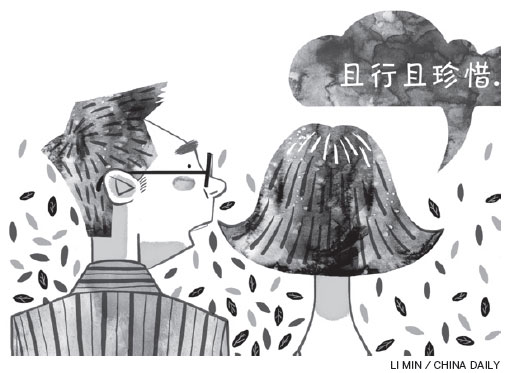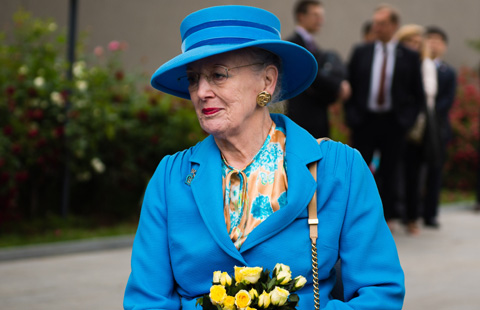The calculated wisdom of the 'first wife'
Updated: 2014-05-10 07:20
By Raymond Zhou (China Daily)
|
|||||||||||
Extramarital affairs are not uncommon; it is unusual when every development of the affair is scrutinized by a billion plus onlookers.
When Chinese film and television star Wen Zhang was recently exposed for carrying on an illicit affair with another performer, both he and his actress wife, Ma Yili, were thrown into the maelstrom of public attention. Wen immediately apologized, and his wife, almost in lockstep, quickly accepted his apology, effectively taking the heat off him.
Any public-relations expert could have drafted Wen's statement of apology, which basically tested his sincerity. It is the wife's acceptance that was the trickiest part. Without the intermediary of the media, their words, on the Chinese equivalent of Twitter, would reach hundreds of millions of people and a single misstep would be magnified, leaving no room for correction.

Here was Ma's post: "It's easy to be in love, but not easy to be in marriage. We must cherish it as we go along (且行且珍惜)."
The last sentence has turned into a meme, popping up on all kinds of occasions and in variations. The Chinese original does not contain any subject or object in grammatical structure. It is quite vague as in classical Chinese poetry. Word by word, it means "walking, cherishing".
Who is doing the walking and cherishing? Is it "I" or "we"? It seems "we" makes more sense in this context as it contains an undertone of mild chiding and forgiving.
The Chinese word "xing" (行) means "to walk" and is often used figuratively to mean "to carry on, to move on" etc. "Cherish" (珍惜) should logically be followed by an object. I added "it", but what does "it" refer to? Does it encompass both "love" and "marriage" in the previous sentence? Or, should I borrow a similarly vague English expression and translate it into "cherish what we have"?
The terseness and ambiguity was quite calculated and, to borrow Shakespeare's aphorism, reflected the writer's "soul of wit". Wen's apology was accused of being too wordy, but Ma showed grace and elegance by using as few words as possible. The poetic convention of the sentence left ample space for imagination, and many members of the public extrapolated an image of a suffering but strong woman who displays an admiringly calibrated sense of clemency.
For thousands of years, China was not a society of monogamy. Men could have several wives. Although the practice has long been outlawed, "successful" men are known to keep girlfriends on the side, humorously nicknamed concubines, "second wife" or "little third". Some of them set their goals to replace the current wives while others are content with their status in the gray area.
The public attitude toward the first wife is one of ambivalence. She has always taken the moral high ground as she is the legally wedded spouse, but culturally she is often portrayed as old-fashioned, temperamental and, in the old days, even illiterate. In the early 20th century, many men, especially writers and artists, would "adopt" younger wives - not trophy wives, mind you, but kindred spirits - but they would financially support their first wives, who would otherwise be mired in poverty. There was hardly a love story told from the perspective of the first wife.
In this day and age, the first wife cannot be stashed away. She may be older in age (in Ma's case, six years older than the girlfriend and eight years her husband's senior) and she often exhibits more maturity. Flying into a fit of rage or revenge might be melodramatic, but those who are cool as a cucumber and get their straying husbands back without making a scene are highly regarded.
In Feng Xiaogang's acclaimed film A Sigh, the first wife runs into the girlfriend and invites her into her home. Instead of threatening the younger woman or prying her about details of the infidelity, she calmly recounts the early years her husband and her met and dated. By the end of her narration, the girlfriend leaves - in despair. It has dawned on her that the man she is in love with has loved another one just as ardently and may well repeat this cycle. She is by no means his one and only, not now and possibly not in the future.
Similar scenes are more and more accepted in Chinese family drama. Ma Yili, playing a real-life first wife, is exemplary in this new tradition.
She did not use the word "forgive", nor did she come across as moping and pathetic. She held her head high.
Maybe by "cherish", she also meant that her husband should hold dear what she's doing now. Maybe next time she would not be so forgiving.
(China Daily 05/10/2014 page11)
Today's Top News
US museum to return statue to Cambodia
Stronger protection eyed for overseas Chinese
China CPI up 1.8% in April
Thai PM faces ban from politics
Letter asks for leniency in poisoning case
Suspect killed in Xinjiang attack
Chinese premier arrives in Angola for visit
Property tracking system launched
Hot Topics
Lunar probe , China growth forecasts, Emission rules get tougher, China seen through 'colored lens', International board,
Editor's Picks

|

|

|

|

|

|





